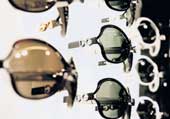 |
| EYE SPY: Choosing the right accessories is as important as selecting the right suit |
Dress to impress. First impressions are vital in job interviews and what you wear is important, but it doesn’t end at attention to sartorial detail.
Whether you’re starting a new job or trying to make a name in your present position, appearance matters. Recruiters, customers and colleagues form their first impressions of how good you are at your job based on how you look; if they don’t like the cut of your jib, your job chances may suffer. Consider this:
• It’s all about the package. Companies spend millions of pounds making their products look fabulous so that we will want to buy them; good grooming and the right outfit has the same role to play when it comes to persuading other people to take you seriously, writes Lesley Everett in Drop Dead Brilliant.
• Suits you. Your clothes should reflect your personality and complement your physique, says Janie Mackintosh, an image consultant. “This will mean that you feel good about yourself,” she says. “You will project positivity and other people will then respond positively.”
• Don’t be dull. Classic styling is good, but this doesn’t mean that you should wear boring or old-fashioned clothes. Shoes and ties can be used to show that you’re in touch with current fashions, Mackintosh says.
And update glasses at least every five years and hairstyles every three, Everett suggests.
• Hair’s a problem. Women should never arrive at work with wet hair, says Sarah Brummitt, an image consultant. Men need to keep their facial hair under control — no five ’clock shadows, bristling nostrils or bushy ears.
• Stinkiness is bad. “There are no excuses for not showering daily and wearing a clean shirt or top every day,” Everett writes.
• Neglect not your gnashers. “Use an electric toothbrush with whitening toothpaste,” Brummitt says. “It takes only two minutes in the morning and it makes a big difference to your appearance.”
• Extra extra. Choosing the right accessories is as important as selecting the right suit. Everett recommends a nice-quality pen, a simple, classic watch and the best handbag or briefcase that you can afford.
• Over is better than under. A proper, formal suit is a good starting point and can be dressed up or down depending on the occasion, Brummitt says. When in doubt, choose the more formal option: it’s easy to take a suit jacket off, if necessary, but it’s much harder to turn a pair of jeans and a shirt into something suitable if you’re suddenly asked to stand in for your boss at a big meeting. Avoid sloppy or unstructured styles at all costs, Mackintosh says.
• Style counsel. Consider getting a professional once-over to make sure that you’re picking colours and designs that suit you and your job.
• Every day is like an interview. Getting a job is no excuse for falling into slovenly habits.
People should put just as much effort into their day-to-day outfits as they did into the ensemble that helped them to win over the recruiter.
“When you go for an interview you pay attention to details like shoes and grooming so that you create the right impression, but you should be doing that every day,” Brummitt says.











